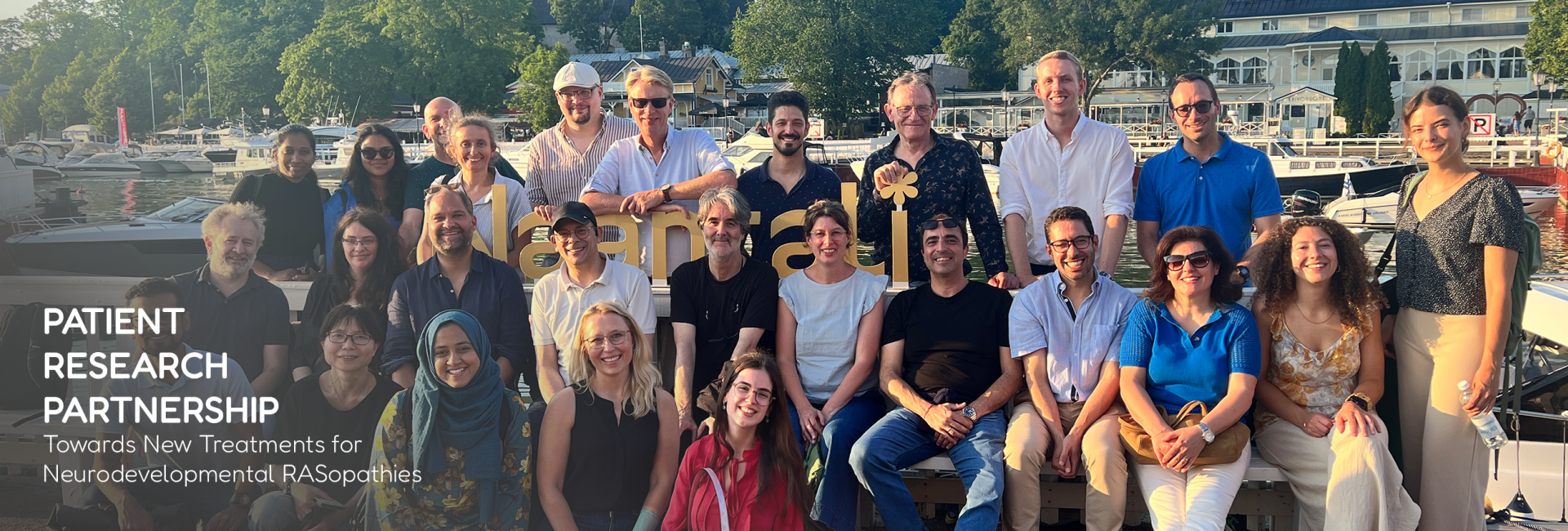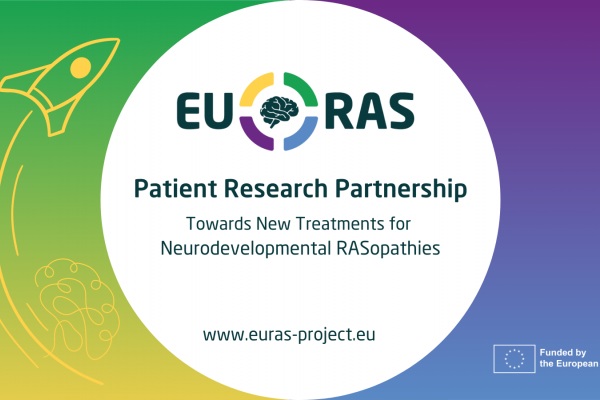New Project “EURAS”
Advancing Treatments for Rare Neurodevelopmental RASopathies: Parents' Initiative for Affected Children Leads to New EU Research Project EURAS
The EURAS consortium brings together patients and researchers to combine patient-reported data with cutting-edge technologies for the development of effective disease management strategies for neurodevelopmental RASopathies.
Erlangen, 18 July 2023 – RASopathies are a group of genetic diseases that arise from increased signalling down the cellular transduction pathway known as RAS, which plays a crucial role in multiple developmental processes. These conditions, with Neurofibromatosis 1 (NF1) and Noonan syndrome (NS) being the most common, can manifest with a wide range of symptoms, including specific facial features, heart defects, skin changes and varying degrees of neurological and neurocognitive impairment. The rarer forms of RASopathies, namely Cardio-facio-cutaneous syndrome (CFC), Costello syndrome (CS), and SYNGAP1-related encephalopathy (SYNGAP1), cause significant neurological impairments, such as intellectual disability, epilepsy, autism spectrum disorder, challenging behaviour, and sleep disorder. While the physical manifestations of RASopathies can be life-threatening, they can be reasonably manageable by multidisciplinary symptomatic treatment. However, there is currently no disease-specific therapy for the neurocognitive symptoms, which imposes a permanent high burden on the patients, mostly children, and their families.
The newly launched collaborative research project "EURAS" promises to make a fundamental contribution to changing the status quo. Initiated by the German patient organisation Syngap Elternhilfe e. V., the project aims to gain a deeper understanding of the underlying disease mechanisms, create a framework for improved diagnosis, and develop effective treatments for neurodevelopmental RASopathies. With these goals in mind, the consortium sets out to improve the lives of RASopathy patients and their caregivers while strengthening European and global health systems.
EURAS is coordinated by the Universitätsklinikum Erlangen, Germany, and will be funded with over EUR 8 million from the European Union’s Horizon Europe Framework Programme for Research and Innovation over the next four years. The Associated Partner the University of Edinburgh received funding from UKRI Innovate UK.
Connecting Patients and Researchers Throughout the Project Journey
EURAS arose from an initiative of dedicated parents of affected children and is designed to provide solutions for their most urgent needs. While each scientific partner will contribute their unique expertise to achieve the project’s objectives, patients are at the heart of the EURAS project. “We strongly believe that the involvement of patient organisations as equal partners can make a significant impact. It ensures the seamless integration of patients' perspectives and needs throughout the entire project. Additionally, it provides us with a unique opportunity to access large patient cohorts, which is especially challenging for rare diseases but essential for achieving the project's clinical objectives,” states Prof. Anna Fejtova, Professor of Molecular Psychiatry at the Universitätsklinikum Erlangen and scientific coordinator of EURAS.
Through their national organisation, 1,200 families from 13 European countries have pledged their support for the EURAS work. “We are delighted to make our significant contribution to the EURAS project by establishing a Europe-wide patient network to connect with patients and raise public awareness. The transnational network will also facilitate exchange among affected families,” says Verena Schmeder, EURAS Patient Board Officer and President of Syngap Elternhilfe e. V. The patient organisation will coordinate the recruitment for the planned European Patient Registry that welcomes CFC, CS, and SYNGAP1 patients, as well as patients with Noonan Syndrome. Patients, families, clinicians, and caregivers interested in this registry can pre-register via www.rasopathies.eu.
Leveraging State-of-the-Art Technologies to Understand and Treat Neurodevelopmental RASopathies
The integration of patients’ perspectives with methods from multiple disciplines will help enhance scientific knowledge while ensuring a focus on actionability. The patient report-based registry, designed by a team of clinicians, bioinformaticians and patient representatives specifically for neurodevelopmental RASopathies, will allow for the stratification of patient cohorts, assessment of disease progression, and evaluation of treatment effectiveness. Stem cell technology will be used to develop novel disease models aiming at investigating disease mechanisms and testing the efficacy of treatments. Unbiased high-throughput phenotypic screens will be performed to identify new effective compounds. Furthermore, EURAS partners aim to develop new technologies for the delivery of therapeutic compounds to the brain and conduct preclinical proof-of-concept trials with repurposed drugs, antisense oligonucleotides, and motor-cognitive training.
Through these measures, the project will ultimately lead to the identification and implementation of new, less invasive treatments for patients. Moreover, EURAS will increase awareness, promote exchange, and provide patients and families with new state-of-the-art knowledge and therapies. “We are grateful to have been successful with our initiative and proud that we were finally selected in the Horizon Europe call. This proves that persistence and patient engagement can pay off even for small patient organisations. I hope that our initiative will inspire others,” says Marcos Mengual, Vice President of Syngap Elternhilfe e. V. and one of the project’s initiators.
The EURAS consortium holds its Kick-off meeting at Universitätsklinikum Erlangen and Friedrich-Alexander Universität Erlangen-Nürnberg on July 18-20, 2023.


